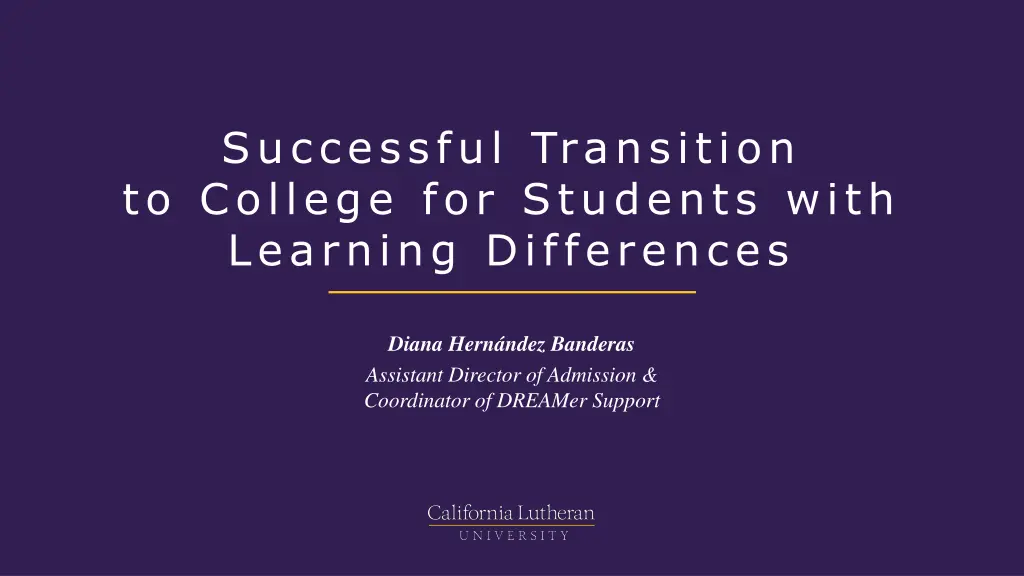
Successful College Transition for Students with Learning Differences
Discover the foundation, important laws, key takeaways, and types of services essential for a successful transition to college for students with learning differences. Understand key laws like Section 504 and the Americans with Disabilities Act, along with the rights provided by the Family Educational Rights and Privacy Act. Learn about accommodations, documentation requirements, and student rights ensuring a smooth academic journey.
Download Presentation

Please find below an Image/Link to download the presentation.
The content on the website is provided AS IS for your information and personal use only. It may not be sold, licensed, or shared on other websites without obtaining consent from the author. If you encounter any issues during the download, it is possible that the publisher has removed the file from their server.
You are allowed to download the files provided on this website for personal or commercial use, subject to the condition that they are used lawfully. All files are the property of their respective owners.
The content on the website is provided AS IS for your information and personal use only. It may not be sold, licensed, or shared on other websites without obtaining consent from the author.
E N D
Presentation Transcript
Successful Transition to College for Students with Learning Differences Diana Hern ndez Banderas Assistant Director of Admission & Coordinator of DREAMer Support
Overview Foundation Important laws Key Takeaways Types of Services Getting Started
Important laws to know Section 504, Americans with Disabilities Act, The Family Educational Rights and Privacy Act Section 504 Any school that gets federal funding must make sure that students with disabilities are not excluded Must provide appropriate supports and accommodations Americans with Disabilities Act Also applies to schools that don t receive federal funding. The Family Educational Rights and Privacy Act (FERPA) Allows students the right to inspect their education records Colleges and universities will maintain the confidentiality of those records The institution will not disclose information from those records without the student's written consent Exceptions include cases of emergency and personal safety, and to notify parents of changes in their student's academic standing
You cannot be denied admission because of a disability.
You do not have to tell the school about your disability, but you do have to tell them if you want accommodations.
Your school has to provide accommodations for all classes, on- campus or school-sponsored extra- curricular activities, and housing.
Your school may require you to provide documentation of your disability in order to get accommodations.
Accommodations and any other adjustments are made depending on your disability and needs.
You cannot be charged extra for academic adjustments, programs, or activities that are available to students without disabilities.
Most schools have a Disability Services Office (it may have a different name). Go to it to deal with any issues, such as getting accommodations, academic adjustments, or any instances of discrimination
What services can you receive? These are just some! Testing accommodations more time for tests, test taking in a quiet environment, or test proctoring Sign language interpreters Real-time captioning Classroom materials in an accessible format large print, books on tape or CD, electronic text, or Braille Lab assistance Adaptive equipment Moving the classroom to a wheelchair-accessible location Note-taking services Tutoring Van service
Things to think about/consider My recommendations Decide whether to disclose the disability. Book an appointment with the disability office. Ask the right questions Check for special programs. Make sure paperwork is in order. Students need to be proactive.
Sources https://ca.db101.org/ca/situations/youthanddisability/education/program2g.htm#:~:text=You%20cannot% 20be%20denied%20admission,%2Dcurricular%20activities%2C%20and%20housing. https://www.cappex.com/articles/applications/college-admission-for-students-with-learning-disabilities https://www.callutheran.edu/parents-families/ferpa.html
Questions? Diana Hern ndez Banderas dehernan@CalLutheran.edu (805) 493-3143
